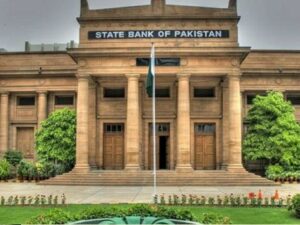 EDITORIAL by Business Recorder: In the presence of the State Bank of Pakistan (SBP) Governor and presidents of a number of banks, the scheme for Electronic Warehouse Receipt Financing (EWRF) for maize crop in Chunian, district Kasur, was launched. Most of these busy bankers and central bankers came all the way from Karachi to a small district in Punjab. That shows the resolve and commitment of the central bank to push this much-needed initiative.
EDITORIAL by Business Recorder: In the presence of the State Bank of Pakistan (SBP) Governor and presidents of a number of banks, the scheme for Electronic Warehouse Receipt Financing (EWRF) for maize crop in Chunian, district Kasur, was launched. Most of these busy bankers and central bankers came all the way from Karachi to a small district in Punjab. That shows the resolve and commitment of the central bank to push this much-needed initiative.
Pakistan is one of the very few agricultural economies where collateral management system is not present. The conceptualization of the EWRF started a decade ago and now the ball seems to be rolling. This step shall go a long way towards achieving financial inclusion for small farmers and rural families, and in the long-term, the benefits shall accrue to farmers, aggregators, processors and exporters. The macro advantage is visibility of stock with traceability for all agricultural commodities — perishables and non-perishables. There would be lower wastage and banks shall find a new asset class to lend.
Right now, the use of EWRF is limited to four districts and for two crops — maize and paddy. The journey started in 2010, but the meaningful work started in 2019 when SECP (Securities and Exchange Commission of Pakistan) issued the Collateral Management Companies (CMC) Regulations. On that basis, some private sector companies that process agricultural commodities took interest and formed a company by the name of Naymat Collateral Management Company (NCMC) in 2020.
The company approached banks to join as without access to credit the process cannot move forward. Three banks —Habib, MCB and Faysal — became partners in NCMC. The first step is to set up warehouses. The next step is to fill them with agri products. Depositors can be farmers, traders, middlemen, etc. The challenge was who shall lead this whole function — collateral management company, food processers or banks. Since banks have the financial muscle they are best suited to lead.
In early 2021, two banks — HBL and BoP (Bank of Punjab) — stepped forward to take the initiative and signed system user agreements. The first warehouse receipt was issued by HBL in March 2021 and BoP followed in April 2021. Meanwhile, NCMC was working on roping in other warehouses in the system. They were able to accredite them.
Right now, silos and godowns at five warehouses are accredited. SBP is giving a refinancing facility for warehouse development at end-user rate of 6 percent. Concurrently, SECP has issued warehousing guidelines and SOPs in addition to CMC regulations. In the end of 2021, the SBP Governor pushed other banks to come into the play. A working group was formed and based on its recommendations a task force was formed. And based on that process, the launch event took place where all the banks operating in the region have signed on.
The short-term target is to expedite financing on existing facilities. And gauging interest exhibited by banks, the viability in the warehouse operating business is expected to develop further. Once farmers and others can get financing from banks on stored assets, they would tend to use it more and that would attract others to use this mode of financing. This would also incentivize more and more people to invest in constructing warehousing as the demand for warehousing increases. The key is economies of scale. For that SBP might have to enhance its warehouse concessionary refinancing limits and tailor the scheme so as to incentivize warehousing for agriculture products to be built near farmlands.
One misconception many have is that this facility aims to replace the Arthi and the middleman who would never let that happen. Well, in essence, EWRF can complement the Arthi and the middleman as they too can become a player using this facility. They could even become warehouse operators, input providers or a franchisee of a bank. In India, there are instances where the middlemen have become agency companies for banks. This can surely happen in Pakistan as well. All that Arthis need to see is that this is a lucrative process. It is important that the system should be transparent to minimize the exploitation of small farmers in particular.
Having said that, not many Arthis (as they like to operate in the shadow economy) are expected to come forward and join. However, there is ample room in the market for EWRF to nurture and develop into a significant player. Right now, banks (such as HBL) are already financing tens of thousands of farmers and they are availing bank financing as they see value addition for them. EWRF could be attractive for many farmers too. Once farmers understand the value, they would surely come.
The value is to get financing without any outside collateral and existing banking relationship. Farmers would not need to submit passbooks and would not need to take multiple approvals. The loan processing time would be 1-3 days instead of a few weeks. Effort should also be made to include remote players as trading of these receipts is important. Here the role of NCCPL (National Clearing Company of Pakistan Limited) is important. This would give confidence to traders and exporters to join the ride. Right now, the focus is to develop the model in two crops — maize and paddy — where the challenges are less. However, to get it up to the scale in the long-term other commodities, especially wheat, should be part of it.
Wheat is a difficult nut to crack. The government’s involvement is far too much in wheat buying, selling and fixing prices. Primarily, wheat, like sugar, is a politicized commodity and banks are not comfortable with it. There are fears that accountability agencies may poke their nose if ERWF has wheat in it. The government needs to understand that the sums it spends through PASSCO and other agencies in wheat commodity financing can substantially be reduced if wheat farmers get private EWRF. But that is a long shot. For having wheat and others in EWRF the success needs to be demonstrated in maize and paddy in a significant manner.
Source: https://www.brecorder.com/news/40157558

